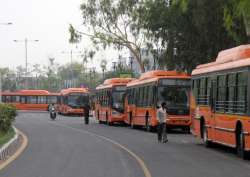Delhi HC slams AAP government for not buying disabled-friendly buses
The observation came after the Delhi government's counsel told the court that it had invited bids for low-floor buses four times but there was only a single bidder (Tata Motors) and the cost was unreasonable and unjustifiable.

The Delhi High Court on Wednesday came down heavily on the city government for not buying low-floor disabled-friendly CNG buses due to their high cost.
"For the last 10 years you have justified not buying low-floor buses, saying the price was unrealistic without saying what is realistic or carrying out an empirical study," the court said
The court questioned the basis for the government's assessment that the cost cited by Tata Motors and Ashok Leyland for supplying the low-floor buses was "unrealistic, exorbitant and unjustifiable", asking it to take a "practical, pragmatic and realistic view".
"If you are comparing low-floor buses with standard floor buses to say the cost is unrealistic, then it is like comparing apples with oranges," it added.
"We are pained. Sometimes you have to see what you are balancing the cost against," said the court, adding that if there was only a single manufacturer of a specialised product, then the government should go for it by taking into account the interests of the disabled persons as well as the environment.
The observation came after the Delhi government's counsel told the court that it had invited bids for low-floor buses four times but there was only a single bidder (Tata Motors) and the cost was unreasonable and unjustifiable.
The court also impleaded Tata Motors and Ashok Leyland as parties in the matter, so that they could inform it about the basis for the costs of their low-floor CNG buses.
During the hearing, the court even said that it could send officials to jail for contempt of the Supreme Court's 19-year-old direction to augment its bus fleet.
However, the court said the city needed more buses now rather than officials in prison.
"We can still send you to jail. But what the city needs is buses, not you in jail."
In 1998 the Supreme Court had directed the government to augment its bus fleet from 5,000 to 10,000.
The court was hearing a PIL filed by a person suffering from locomotor disability, challenging the Delhi government's move to procure 2,000 standard floor buses at a cost of Rs 300 crore.